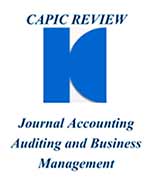Published 2015-12-10
Keywords
- Evaluation,
- Financial Information,
- SMEs,
- Useful
How to Cite
Abstract
With the adoption of resolution No- SC.Q.ICI.004, the Superintendency of Companies ordered that the businesses under their control have the obligation to file financial information with international regulations it was ratified in No- ADM resolution. 8199002E. In this situation, the position to adopt those standards by Ecuadorian SMEs, should have been based on the degree of usefulness of financial information prepared with Ecuadorian law. For this reason, this research provides empirical evidence regarding the characteristics of SMEs compared to harmonization process with the objective of determining whether the information submitted with Ecuadorian legislation allows fulfilling the utilitarian paradigm of financial information. The instrument used is the opinion poll, which allowed it to collect important to the development of research variables. The sample of companies amounted to 330. Once the information collected, the Student t test was applied and F of Anova. After the analysis of empirical evidence, it is concluded that the financial information prepared with local regulations violates this paradigm, and that this should be the objective with which the information is prepared; Likewise, the failure is due to the approach of management accounting considering a cost and not an investment; finally, the evidence determines that another aspect of the problema of utility is given by the involvement of the manager in accounting issues.
Downloads
References
2. Carmona, S. y J. Céspedes (1996). Información contable externa y posición competitiva. Madrid: Instituto de Contabilidad y Auditoría de Cuentas.
3. Carsberg, B., M. Page, A. Sindall and I. Waring (1985). Small company financial reporting. London: Prentice-Hall Internacional.
4. Castrillo, L., & Navazo, J. (1998). Proyecto de investigación: sistemas financieros, decisiones financieras y el gobierno de la empresa en los países de la OCDE.
5. Cuellar, Demartini, & Paolini. (2001). El impacto de la información financiera para la PYME en la unión europea: el caso de Italia y España. Técnica Contable, 131-144.
6. Del Brío, E. (1995). El sistema de información contable. Actualidad Financiera, 1143-1159.
7. European Commission, EC (2002): Regulation European Communities (EC) nº 1606/2002 of the European parliament and of the council of 19 July 2002 on the application of IAS, Brussels.
8. Fuertes, I. (2007). Un análisis del grado de comparabilidad de la información. España.
9. Fourth Council Directive 78/660/EEC of 25 July 1978 based on Article 54 (3) (g) of the Treaty on the annual accounts of certain types of companies. Vol.01. Pág. 55-73
10. Gabás, F. y A. Bellostas (2000). El marco conceptual para la información financiera. Análisis y comentarios. Madrid: AECA.
11. García, J. (1992). La utilidad de la información financiera para analistas de inversiones. Revista española de financiación y contabilidad, 29-55.
12. Giner, B., & Pardo, F. (2011). La relevancia valorativa del resultado global frente al resultado neto. Revista Española de Financiación y Contabilidad, 307-338.
13. IASB, London.(2009). IFRS for small and médium sized entities. www.ifrs.org
14. Inchausti, G. (2000). El marco conceptual para la información financiera. Análisis y comentarios, marco conceptual e investigación empírica. Madrid: AECA.
15. Kaplan, A. (1948). Small business, its place and problems. New York: McGraw-Hill.
16. Khalik, A. (1983). Financial reporting by private companies analysis and diagnosis. Fasb. Stamford.
17. Labrador Barrafón, M. (1998). ¿Es útil la información contable en la mediana empresa? Efectos de PGC de 1990. Partida Doble, 58-67.
18. Laffarga Briones, J. (1999). El análisis económico-financiero de las pequeñas y medianas empresas. V Jornadas de Trabajo sobre análisis contable. Cádiz: Asociación Española de Profesores Universitarios de Contabilidad (ASE- PUC).
19. Manzano, M., & Martínez, I. (2009). Comparabilidad de la Información Financiera de las empresas. México.
20. Martínez Gómez, F. (1998). Competitividad: formación, simplificación, fiscalidad. Iniciativa Pyme de Desarrollo Empresarial, 771, 31-39.
21. Moneva, J. (1999). Información financiera en PYMES: análisis y perspectivas futuras. Partida doble, 54-63.
22. Moneva Abadía, J. M. (1993). El marco de la información contable de Pymes. ICAC, Madrid.
23. Moneva, J., & Cuellar, B. (1999). Utilidad de la información financiera obligatoria para la gestión: Análisis de la PYME Española. Revista de Contabilidad, 137-159.
24. Moneva, J., Cuéllar, B., Demartini, P., Paolini, M. (2001). El impacto de la información financiera para la Pyme en la Unión Europea: el caso de Italia y España. Técnica contable, 53(626), 131-144.
25. Pajunen, K. (21 de 06 de 2010). International Financial Reporting Standards in Relation to Finnish Accounting Traditions – A Survey of Finnish Accounting Professionals. Finlandia.
26. Palacios, M., Polo, S., Soto, P., & Martínez, I. (2008). “Avances en el proceso de armonización contable en México: un estudio empírico”. México DF, México.
27. Paolini M. and P. Demartini (1997). Small Company financial reporting: users and information needs.
28. Rivero Fernández, M. D. y E. Ochoa Laburu (2002). Nivel de divulgación de la información financiera de las empresas gallegas y guipuzcuanas como respuesta de la adaptación de la legislación mercantil española a las directivas comunitarias un estudio empírico. Revista de contabilidad y comercio 229: 88-119.
29. Rojo, M., P. Lamothe, E. Moreau (1983). Financiación de la pequeña y mediana empresa. Servicios de publicaciones de la CAI-APC, Zaragoza.
30. Ruiz, C. (2012). La utilidad de la información contable: El papel de los Intangibles. Revista de estudios empresariales, 149-172.
31. Salas Ríos, M. (2003). La auditoría en las pequeñas y medianas empresas. Revista técnica 21: 16-21.
32. Serra Salvador, V, (2002). Las Pymes y las obligaciones contables ante la reforma. Partida doble 136: 70-77.
33. Sierra, G., & Escobar, B. (1996). Sistemas de información para la gestión. Partida Doble, 47-49.
34. Terzungwe, N. (2012). Expected Benefits of Implementing Global Accounting Standards by. International Journal of Business and Management.
35. United Nations Conference on Trade and Development, UNCTAD (2000). Re- port of the Intergovernmental Working Group of Experts on International Standards of Accounting and Reporting On Its 19th Session. September, Ginebra.


































